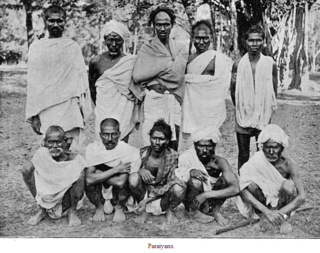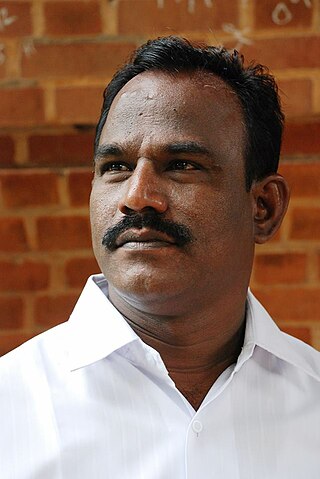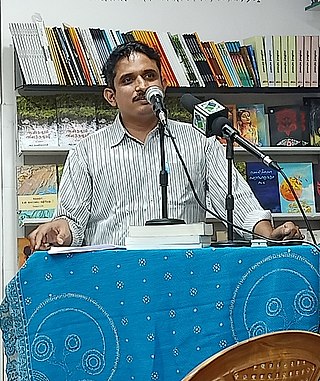
Bahuleyan Jeyamohan is an Indian Tamil and Malayalam language writer and literary critic from Nagercoil in the Indian state of Tamil Nadu.

Paraiyar, or Parayar or Maraiyar, is a caste group found in the Indian states of Tamil Nadu and Kerala and in Sri Lanka.

S. Joseph is an Indian poet writing in Malayalam in the post modern era. He was born in the village of Pattithanam near Ettumanoor. He has published a number of works on contemporary issues that affect the common man and also the ones who toil in the lower rungs of the society. His poetry collection Uppante Kooval Varakkunnu won the 2012 Kerala Sahitya Akademi Award.
C. Iyothee Thass was an Indian anti-caste activist and a practitioner of Siddha medicine. He famously converted to Buddhism and called upon the Paraiyars to do the same, arguing that this was their original religion. He also founded the Panchamar Mahajana Sabha in 1891 along with Rettamalai Srinivasan. Panchamas are the ones who are outcastes. "Iyothee Thass" is the most common Anglicized spelling of his name; other spellings include Pandit C. Ayodhya Dasa, C. Iyothee Doss, C. Iyodhi Doss, C. Iyothee Thoss, K. Ayōttitācar (avarkaḷ), K. Ayōttitāsa (paṇṭitaravarkaḷ), or Ayothidas Pandithar.
A.R. Venkatachalapathy is an Indian historian, author and translator who writes and publishes in Tamil and English. Currently he is a professor at the Madras Institute of Development Studies (MIDS). He is noted for collecting and publishing the works of Tamil writer Pudhumaipithan.

The Dalit Panthers is a social organisation that seeks to combat caste discrimination. It was led by a group of Mahar writers and poets, including Raja Dhale, Namdeo Dhasal, and J. V. Pawar in some time between the second and the third semester of 1972. The movement's heyday lasted from the 1970s through the 1980s, and it was later joined by many Dalit-Buddhist activists.
Dalit literature is a genre of Indian writing that focuses on the lives, experiences, and struggles of the Dalit community, who have faced caste-based oppression and discrimination for centuries. This literature encompasses various Indian languages such as Marathi, Bangla, Hindi, Kannada, Punjabi, Sindhi, Odia and Tamil and includes diverse narratives like poems, short stories, and autobiographies. The movement originated in response to the caste-based social injustices in mid-twentieth-century independent India and has since spread across various Indian languages, critiquing caste practices and experimenting with different literary forms.
Azhagiya Periyavan is the pen name of C.Aravindan, a modern Tamil writer and journalist. He writes about Dalit issues.
Bama , also known as Bama Faustina Soosairaj, is a Tamil Dalit feminist, teacher and novelist. Her autobiographical novel Karukku (1992) chronicles the joys and sorrows experienced by Dalit Christian women in Tamil Nadu. She subsequently wrote two more novels, Sangati (1994) and Vanmam (2002) along with three collections of short stories: Kusumbukkaran (1996) and Oru Tattvum Erumaiyum (2003), 'Kandattam'(2009). In addition to this, she has written twenty short stories.
Vishnupuram Award is a literary award instituted by Vishnupuram Ilakkiya Vattam, the literary organization created by writer Jeyamohan and his readers. The award was named after the writer's famous novel in Tamil, Vishnupuram. This award was initiated to honour the under-recognized pioneers and senior writers in Tamil literature. This contains cash award of Rs 1,00,000 and a memento, a book on the author will be published and a documentary on the awardee release during the occasion.

Pa. Ranjith is an Indian film director and screenwriter who primarily works in Tamil cinema. He made his directorial debut with the 2012 romantic comedy Attakathi, before earning unanimously positive reviews for his second film, the political drama Madras (2014). In 2016, he wrote and directed the gangster-drama Kabali and in 2018, Kaala both starring Rajinikanth.
Susie Tharu is an Indian writer, publisher, professor, editor and women's activist. Throughout her career and the founding of several women's activist organizations, Tharu has helped to highlight those issues in India.
Kusuma Satyanarayana is an Indian scholar, editor and anti-caste activist. He is a Professor in the Department of Cultural Studies, English and Foreign Languages University (EFL-U), Hyderabad, and concentrates in the burgeoning field of Dalit studies.
Dalit studies is a new field of research in India which looks at the problem of marginalised groups, namely Dalits, tribals, religious minorities, women from excluded groups, denotified tribes, physically challenged and similar groups in economic, social and political spheres. Dalit studies scholars also undertake research on the nature and forms of discrimination and social exclusion faced by marginalised groups.
P.Sivakami is an Indian Dalit-Feminist writer, former IAS officer and activist predominantly writing in Tamil. Her notable works include Pazhayana Kazhidalum, Kurruku Vettu, Nalum Thodarum and Kadaisi Mandhar. Apart from being one of the most prominent Dalit novelists in India, she has also constantly voiced her opinions on contemporary social and political issues. An author of six novels and more than 60 short stories. P. Sivakami has regularly kept in touch with editing and has actively contributed to the monthly magazine Puthiya Kodangi since 1995. She is a significant presence on social media through her Twitter account.

D. Ravikumar is an Indian Tamil intellectual, writer, lawyer politician and an anti-caste activist. He was the editor of the magazine, Nirapirikai. Nirapirikai inspired several new writers in the 1990s in Tamil Nadu. He is an Ambedkarite. Ravikumar is the current Member of Parliament in the Lok Sabha from Viluppuram and member of the Dravida Munnetra Kazhagam.

Imayam is an Indian Tamil-language novelist from Chennai, Tamil Nadu, He has seven novels, eight short story collections and a novella to his credit. He is closely associated with the Dravidian Movement and its politics and considered as one of the leading writers from South India. He is the recipient of the honorary Sahitya Akademi Award for his novel Selladha Panam in 2020. He is also the first Tamil writer to receive the Kuvempu Rashtriya Puraskar National Award (2022) for bringing new sensibilites to Tamil literature through his writings. Noting the writer's proclivity to Dravidian ideals, the Tamil Nadu chief minister M.K.Stalin called him "an ideologue donned in black and red". He lauded Imayam calling him a "proactive writer" in the Dravidian movement.

Aravind Malagatti is a prominent Indian poet and writer in Kannada-language. He is the author of more than forty books which include poetry collections, short fiction collections, a novel, essay-collections, critical works and folklore studies. He is the recipient of the prestigious Ambedkar Fellowship Award from the Government of Karnataka. His Government Brahamana, the first Dalit autobiography in Kannada, has won the Karnataka Sahitya Academy Award. Apart from these, the Honorary Award of Karnataka Sahitya Academy was conferred on him for his total contribution to Kannada literature. He is appointed as Chairman for Kannada Sahitya Academy.
Vishnupuram Ilakkiya Vattam is a literary organization created by Tamil writer Jeyamohan and his readers and fans. It is named after his noted work Vishnupuram. It is currently based out of Coimbatore in Tamil Nadu, India and is being coordinated by K.V.Arangasamy. It awards the Vishnupuram Award every year.

R. Kaliprasadh is a Tamil writer. He has written short stories, translations, and literary reviews and criticism.








